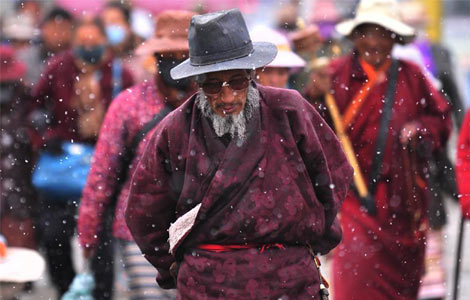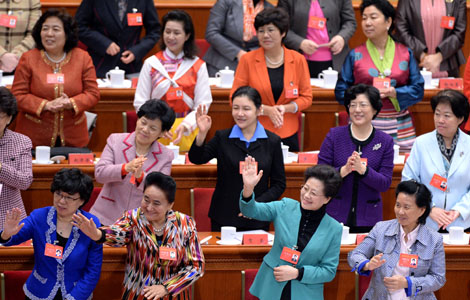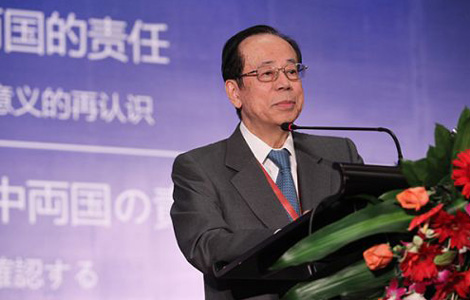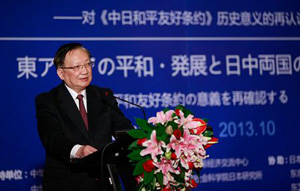Updating govt procurement
Updated: 2013-10-29 07:18
By Liu Rui (China Daily)
|
||||||||
As China continues talks on agreement, it needs to improve its legal provisions while seeking understanding on SOEs
China agreed to join the World Trade Organization's Government Procurement Agreement, which is meant to ensure foreign businesses are allowed to compete for a country's government purchase deals, when it became a member of the multilateral trade body in 2001. Negotiations on its GPA membership, which started at the end of 2007, have now entered a crucial stage.
Judging from the latest developments, the largest disagreement between China and GPA parties such as the United States and the European Union lies in whether and to what extent China's State-owned enterprises will be covered by the agreement. At the same time, the failure to set up a unified government procurement system and the considerable gap with new GPA terms also present obstacles.
China believes its SOEs, which are huge both in their number and their business scale, are in essence different from state firms in the West and thus should not be included in its government procurement agreement. However, the US, the EU, Japan, the Republic of Korea and other GPA parties claim that China's SOEs are heavily controlled or influenced by the government, and do not belong to independent market entities and thus should be listed within the range of government procurement.
Established under different economic systems, China's SOEs and those in Western countries do indeed have huge differences in their nature and scale, as well as the fields they engage in. Compared with Western countries that have gradually opened their government procurement markets to regional or international suppliers in the process of privatization, China has been pushing for a moderate opening-up of its government procurement market under the precondition that the foundation of its established public ownership system will not be rocked. Given that state firms in Western countries are in essence more alike to China's institutions that usually do not engage in profit-oriented economic activities, it is thus unreasonable and also unrealistic to demand China include its SOEs in its government procurement market as Western countries do.
Also whether China's SOEs are included should be based on the principle of reciprocity, which means GPA parties should allow the same state sector opening-up as China, instead of China unilaterally expanding its government procurement market to foreign suppliers. China's institutions also have a large scale, but they have the more obvious nature of public utility and thus are more reasonable to be included into the country's GPA accession offer.
China is still a developing country and any exorbitant GPA demands for the opening-up of its government procurement market will not only compromise China's national interests, but also mean it receives unfair treatment. It will also have a negative effect on the GPA's efforts for membership expansion in the future and harm the GPA's long-term development.
China has made tangible headway in its legal framework for government procurement. However, quite a few problems have also been exposed in this process, ranging from the obvious conflicts between the Government Procurement Law and the Law of Tendering and Bidding to the lack of a set of complete system for the Government Procurement Law. At the same time, the lack of standardized procurement procedures, the rigid bidding formality and the failure to meet enterprises' diversified procurement demands have also hampered its efforts to move closer toward the terms of the GPA. All these problems have seriously affected the normal functioning of China's government procurement and slowed its steps toward GPA accession.
In recent years, the EU and other GPA parties have repeatedly demanded China should improve its legal system concerning government procurement to bring it in line with GPA terms. Experts have pointed out that a major challenge to China's GPA accession lies in the adjustment and improvement of its domestic government procurement system, a problem that has not yet drawn enough attention from the government.
For example, no effective measures have been taken to resolve the long-established conflicts between the Government Procurement Law and the Law of Tendering and Bidding, and no supplementary laws and regulations aimed at improving the Government Procurement Law to make it more operable have been worked out since public opinions were solicited in 2010.
China started its GPA accession talks in the context that it has not set up a full-fledged government procurement system and its government procurement market is not fully open to the outside world. Despite progress in the years, it still needs time to align domestic systems in line with GPA rules and requirements.
While taking a positive posture toward the GPA talks, China should also learn from the experiences of other GPA parties and their legislation on government procurement. Otherwise, unfamiliarity with GPA rules after China's accession will not only directly affect domestic enterprises' bid to enter other countries' government procurement markets, it will also cause disputes and conflicts when foreign enterprises enter China's government procurement market. Such a scenario will compromise China's national interests and international image.
The author is a professor with the Department of Law, the Chinese Academy of Governance.
(China Daily 10/29/2013 page8)
- Procurator sacked for lavish wedding
- Government procurement undermines credibility
- Chief justice, procurator: carrying public hopes for justice
- Cao re-elected procurator-general of Supreme People's Procuratorate
- China's top procurator reports work
- Government procurement pays hefty prices
- Survey highlights opaque govt procurement
 ABC apologizes for 'Kimmel' joke
ABC apologizes for 'Kimmel' joke
 Snowfall hits many areas of Tibet
Snowfall hits many areas of Tibet  Lang Lang named UN Messenger of Peace
Lang Lang named UN Messenger of Peace Antiquated ideas source of Abe strategy
Antiquated ideas source of Abe strategy
 Storm wrecks havoc in S Britain, leaving 4 dead
Storm wrecks havoc in S Britain, leaving 4 dead
 Women's congress aims to close income gap, lift status
Women's congress aims to close income gap, lift status
 Sao Paulo Fashion Week held in Brazil
Sao Paulo Fashion Week held in Brazil
 Serena beats Li Na for WTA title
Serena beats Li Na for WTA title
Most Viewed
Editor's Picks

|

|

|

|

|

|
Today's Top News
Is Obama's lack of transparency really his fault?
San Diego Symphony debuts at Carnegie
Lang Lang takes on UN `Messenger of Peace’ role
At 72, China’s ‘Liberace’ still wows fans
Penn State: 26 people get $59.7m over Sandusky
China providing space training
Miscommunication causes conflicts
ABC apologizes for 'Kimmel' joke
US Weekly

|

|






